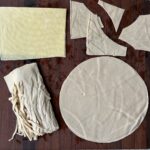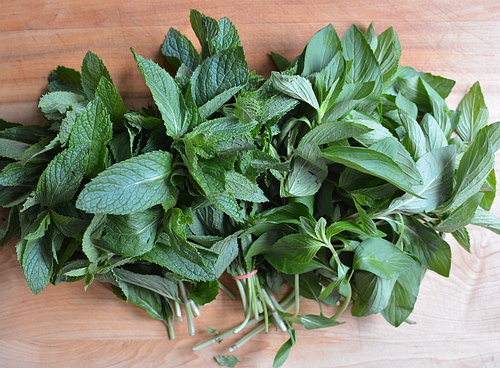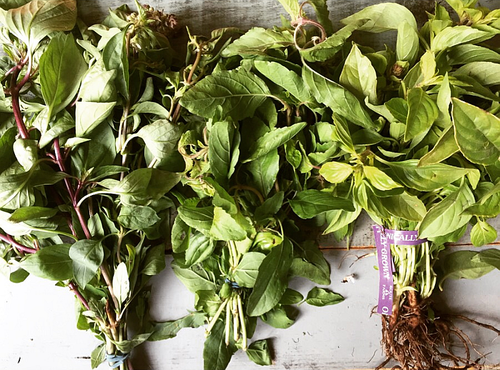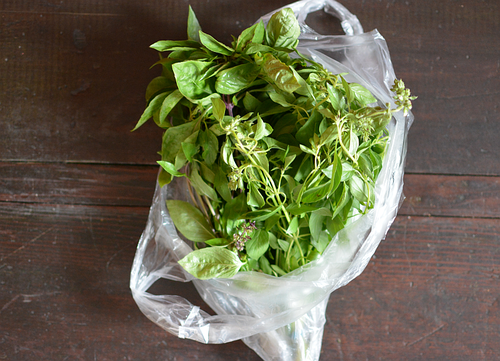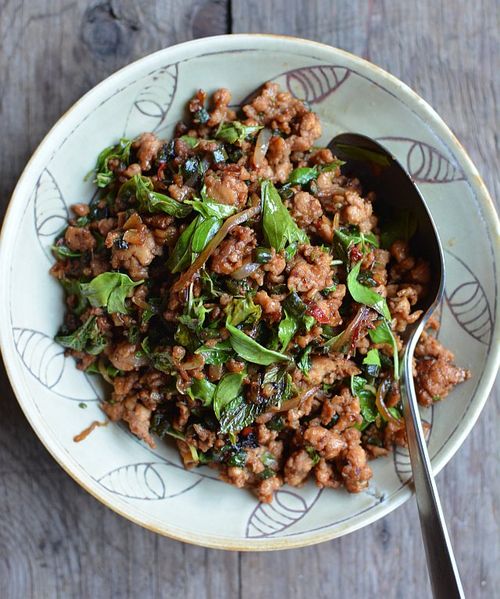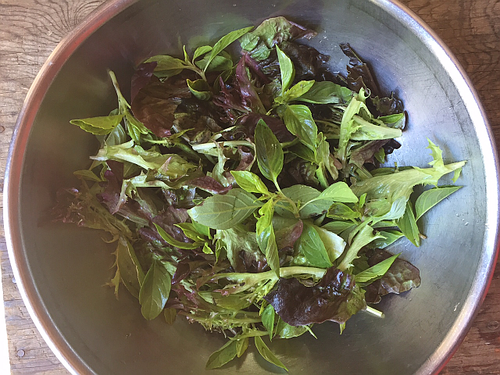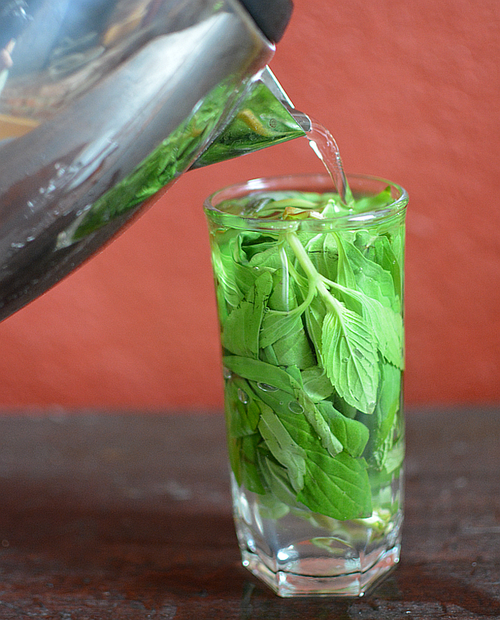This past week, Lajoiedu and I had a Facebook conversation about fresh herbs. She bought a bunch of different kinds for her garden and asked what she could do with them once they started thriving in summer heat. I don't know where Lajoiedu lives but I was feeling very herbacious myself. I'd planted some in our backyard bed, been harvesting sprigs from the garden (which encourages growth), and been buying bodacious bunches at the farmers’ market and Asian markets (I’m a sucker for good deals on herbs). It's as if fresh herbs are suddenly everywhere.
Right now, the herbs at Asian markets are super lush. The leaves are ginormous, which makes me wonder a bit how they got the leaves so big, but I also noticed that warm weather has stoked the mint growing in front of our local hippie health food store. Then I remembered that the size of herb leaves depends on the variety. Whatever that sells at my Chinese-Vietnamese market is huge.
The two bunches I bought for the recent pho class were the equivalent of 3 bunches each. I used up just a small amount for class and kept the rest in water in the fridge with a produce bag covering it to keep them perky. I had spearmint and spicy mint (hung cay, on the right above), which has an extra layer of heat despite its tender looking leaves.
Growing basil challenges me (the bugs love them) so I buy it from the Asian market and regular farmer’s market. Right now, on a weekly basis, Hmong farmer Tra Her supplies me with Thai purple, lemon and holy basil. We’re trade tips and recently she shared:
(1) Store basil in a plastic bag in the fridge. Do not let moisture or much air get into the basil. It will keep fresh for a week without bruising if you keep them in the plastic bag. I’ve tried zip-top bags as well as a thick produce bag and Tra is spot on. If I snipped the basil from a pot, I put it in a glass of water like a fresh-cut flower. Otherwise, it’s going into a bag. This is a major boon for the holy basil that I buy but often don’t get around to using right away. Don't be fussy with it is what Tra says.
(2) Yes, you can make pesto with Asian basils. “Try treating it like Italian basil!” Tra tells customers unfamiliar with Asian basil.
(3) Add a shower of mint and basil to dishes at the end. Tra is a farmer and that’s how she often uses what she grows. The herbs add lots of last-minute flavor.
Like Tra, I cook with lots of Asian herbs. With the mint and basil on hand these days, we're in the season for eating a lot of spicy basil chicken and tofu and Pok Pok’s Thai chicken with basil. I switch out the basil for mint when I run out of basil. I’ve found that for such dishes, leaves that look wilted lend more punch to awaken the preparation.
I’ve added Asian basil and other herbs like tia to (purple perilla) and Vietnamese balm (kinh gioi) to stir-fries and salads. I’ve even finished a pizza with them. Yes, I've added them to banh mi sandwiches instead of cilantro.
Aside from Viet-style lettuce wraps, I also treat the herbs like a salad ingredient, adding a bunch of the leaves to my salad bowl – just in the way that you’d add arugula to other salad greens. The herbs whether mint, basil, cilantro or other kind of herbs, contribute sparks of flavor and perfume. I dress such salads lightly with a whisper of dressing – a little rice vinegar, sugar, neutral oil and touch of water.
This morning, when I found some wilted mint in the fridge, I made a tisane (a fancy term for non-caffeinated tea). A wad of mint went into a glass and then added hot water. I let it steep for hours and drank it later. It was sweet and minty but not like dried mint. My husband liked the tea a lot and I reminded him of how we had fresh mint tea served to us at a high-end restaurant in Manhattan.
Mint is a terrific digestive and I’ve been known to chew on a sprig after a big meal. Unrelated, but parsley is good for that too. Both mint and parsley are great breath fresheners.
What herbs are you growing this summer? Your plans for eating them up?
Related posts:
- My dad's fresh lemongrass tea! (He found an article on lemongrass tea may help cancer patients. Memorial Sloan Kettering Cancer Center has the scoop on it.)
- Vietnamese herb primer: Photos, names, and uses
- Tips for Growing Vietnamese Herbs
- How to Find Vietnamese Herbs for Your Garden












